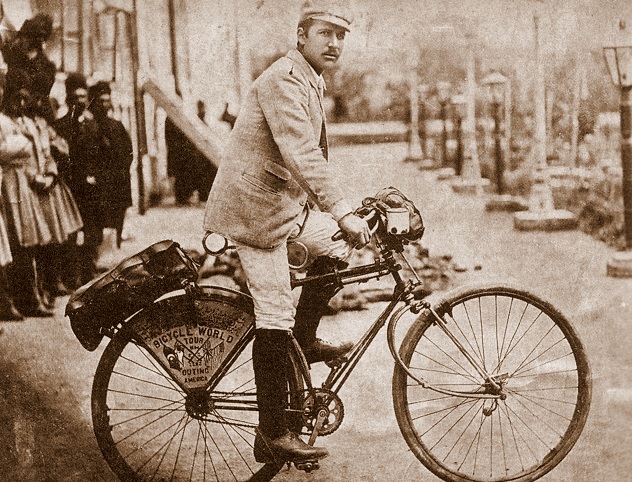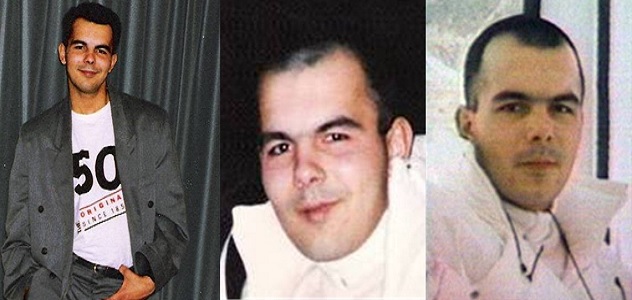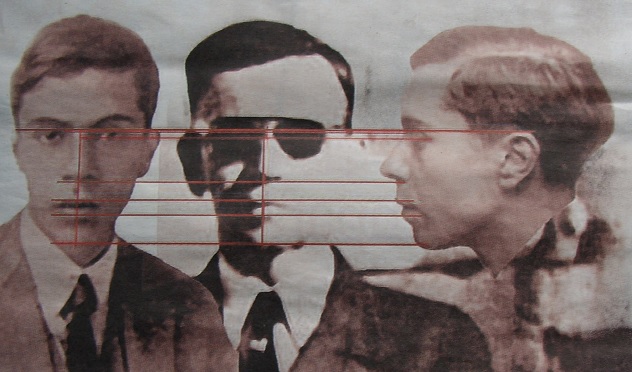 History
History  History
History  Weird Stuff
Weird Stuff 10 Wacky Conspiracy Theories You Will Need to Sit Down For
 Movies and TV
Movies and TV 10 Weird Ways That TV Shows Were Censored
 Our World
Our World 10 Places with Geological Features That Shouldn’t Exist
 Crime
Crime 10 Dark Details of the “Bodies in the Barrels” Murders
 Animals
Animals The Animal Kingdom’s 10 Greatest Dance Moves
 Movies and TV
Movies and TV 10 Box Office Bombs That We Should Have Predicted in 2025
 History
History 10 Extreme Laws That Tried to Engineer Society
 History
History 10 “Modern” Problems with Surprising Historical Analogs
 Health
Health 10 Everyday Activities That Secretly Alter Consciousness
 History
History 10 Dirty Government Secrets Revealed by Declassified Files
 Weird Stuff
Weird Stuff 10 Wacky Conspiracy Theories You Will Need to Sit Down For
 Movies and TV
Movies and TV 10 Weird Ways That TV Shows Were Censored
Who's Behind Listverse?

Jamie Frater
Head Editor
Jamie founded Listverse due to an insatiable desire to share fascinating, obscure, and bizarre facts. He has been a guest speaker on numerous national radio and television stations and is a five time published author.
More About Us Our World
Our World 10 Places with Geological Features That Shouldn’t Exist
 Crime
Crime 10 Dark Details of the “Bodies in the Barrels” Murders
 Animals
Animals The Animal Kingdom’s 10 Greatest Dance Moves
 Movies and TV
Movies and TV 10 Box Office Bombs That We Should Have Predicted in 2025
 History
History 10 Extreme Laws That Tried to Engineer Society
 History
History 10 “Modern” Problems with Surprising Historical Analogs
 Health
Health 10 Everyday Activities That Secretly Alter Consciousness
10 People Who Mysteriously Vanished While Traveling
One of the most famous missing person cases in recent memory involved Natalee Holloway, an 18-year-old American who vanished during a 2005 school trip to the island of Aruba. She has not been seen since.
SEE ALSO: 10 People Who Vanished Only To Mysteriously Reappear
It’s always terrible when someone goes missing, but searching for them becomes particularly difficult when they disappear somewhere they and their loved ones aren’t familiar with. Such as the following travelers who, after they vanished, sadly never returned home.
10John Reed

In 1980, 28-year-old John Reed left his hometown of Twin Cities, California, and traveled to Brazil. He was hoping to find the lost city of Akakor, an ancient underground civilization which had supposedly remained undiscovered in the Amazonian jungles for thousands of years.
Reed had learned about the city in a book called The Chronicle of Akator. The author, Karl Brugger, had written it after learning about Akator from a Brazilian jungle guide named Tatunca Nara (pictured at left), who claimed he had once been chief of a tribe which ruled the city 3,000 years ago. Tatunca lived in the village of Barcelos and ran a lucrative business leading tourists into the jungle to search for Akator. Reed decided to accompany Tatunca on one of these expeditions. Reed left his dog tags and return plane ticket in his hotel room in Manaus, but never came back.
It was eventually revealed that “Tatunca Nara” was actually a German citizen named Gunther Hauck. Tatunca always claimed that Reed ran off and hid in the jungle after they decided to return to Barcelos. However, Reed was not the only person to disappear under suspicious circumstances in Tatunca’s company. During the 1980s, a Swiss man named Herbert Wanner and a Swedish woman named Christine Heuser would also mysteriously vanish during a Tatunca expedition. Wanner’s jawbone was later found.
In addition, Karl Brugger would be shot to death on a Rio street in 1984. Authorities have always believed that Gunther Hauck was responsible for Brugger’s murder and the three disappearances, but there has never been enough evidence to charge him.
9Judy Smith

In 1997, Judy Smith was a 50-year-old mother of two from Newton, Massachusetts. She had recently gotten married to her attorney husband, Jeffrey, and decided to fly to Philadelphia to join him on a business trip.
On April 10, Jeffrey was attending a conference, so Judy decided to go sightseeing in the city. Judy never returned to their hotel that night, so Jeffrey reported her missing. It would be five months before she was found. On September 7, hikers came across her decomposed, partially buried remains in an isolated mountain area. What makes this story truly baffling is that Judy’s remains were found over 960 kilometers (600 mi) away in North Carolina.
An exact cause of death could not be determined but, since Judy’s remains were found in a shallow grave, authorities concluded she was a likely victim of foul play. Since she still had her wedding ring and $167 in her possession, robbery did not seem to be a motive. Even though she normally carried her belongings in a red backpack, a blue backpack was found at the scene. To make things even stranger, there were indications that Judy had traveled to the area voluntarily, as four witnesses reported seeing her in nearby Asheville.
All indications pointed to Judy being in a friendly mood, and a witness who spoke with her said she mentioned her husband was an attorney. If the woman that witness spoke to was indeed Judy Smith, no one knows why she felt compelled to run off without telling her family. And if Judy chose to disappear on her own, how did she wind up dead on a remote mountain?
8Frank Lenz

There are numerous people who have vanished while attempting to fly around the world. However, Frank Lenz has the unique distinction of disappearing during an attempt to cycle the globe. The 25-year-old Lenz was a noted cyclist from Pennsylvania who wanted to attempt a bicycle trip around the world, a journey he expected to take over two years.
Lenz began his trip in Pittsburgh on May 25, 1892, and would spend the next several months travelling across North America before sailing over to Asia. By May 1894, Lenz was cycling through Tabriz, Iran, and his next projected destination was 450 kilometers (300 mi) away in Erzurum, Turkey. But Lenz did not arrive in Erzurum, and he was never seen again.
After not hearing anything from Lenz throughout the summer, his family and friends decided to organize a search for him. Unfortunately, Lenz just happened to be traveling through Turkey during the height of the Armenian Massacres of the mid-1890s. During that time, the Ottoman Empire was responsible for the deaths of tens of thousands of Armenians, and it’s possible that Lenz could have been caught up in the violence and killed.
When another cyclist named William Sachtleben traveled to Erzurum to search for Lenz, he uncovered information that Lenz may have been passing through a small Turkish village in the Kurdistan region, where he inadvertently insulted a Kurdish chief. In retaliation, the chief supposedly ordered bandits to murder Lenz and bury his body. The alleged killers were charged with Lenz’s death, but most of them fled the area or died before they could be imprisoned. The Turkish government eventually agreed to pay compensation to Lenz’s family, but his body was never found.
7Leo Widicker

Even though he was 86 years old, Leo Widicker still lived a very active life. Leo had been married to his wife, Virginia, for 55 years, and they both belonged to a Christian organization called Maranatha Volunteers International. By 2001, the Widickers had worked with Maranatha on 40 humanitarian trips.
For their 41st trip, the couple left their home in Bowdon, North Dakota to accompany the organization to Tabacon Hot Springs, Costa Rica. On November 8, Leo rested on a bench while his wife went off to wade in the hot springs. When Virginia returned about half an hour later, her husband was gone.
It’s theorized that Leo may have fallen asleep on the bench and become disoriented after waking up. Before he disappeared, Leo had been seen asking people if they knew where his wife was. He walked to the resort gate and asked the guards if it was okay to leave, so they opened the gate and watched him walk off down the main road.
Only 15 minutes later, one of Leo’s friends drove that same stretch of road for 10 straight miles but did not see any sign of him. Since Leo did not move very fast, and there were very few places he could have gone, the only logical explanation was that someone might have picked him up. However, an extensive search of the area turned up no trace of Leo Widicker, and he has never been found.
6Karen Denise Wells

Karen Denise Wells was a 23-year-old single mother from Haskell, Oklahoma. She decided to leave her child with her parents in order to visit a friend named Melissa Shepard. Wells rented a car and started on a road trip to go see Shepard in New Bergen, New Jersey.
The last confirmed sighting of Wells took place on the evening of April 12, 1994, when she called her friend from a motel in Carlisle, Pennsylvania. Shepard agreed to meet Wells at the motel and arrived later that night with two unidentified men. Wells was no longer in her room, and most of her belongings had been left behind.
Early the next morning, Wells’s rental car was found abandoned on a remote road 56 kilometers (35 mi) away. The vehicle was out of gas, and its doors were left wide open. Some items were found inside the car—including a small trace of marijuana—and Karen’s wallet and change purse were found in a nearby ditch. The most perplexing clue about the abandoned vehicle was the reading on the odometer, which did not match the distance it would normally take to travel from Haskell to Carlisle. In fact, there was an extra 700 miles which were unaccounted for.
Right before she arrived in Carlisle, there were sightings of Wells in two other towns which would have required her to drive far out of her way. During her last phone call with Shepard, Wells mentioned getting lost several times that day. Nevertheless, there are still many unanswered questions and missing puzzle pieces in Karen Denise Wells’s baffling disappearance.
5Charles Horvath

In 1989, 20-year-old Charles Horvath decided to leave his native England and travel to Canada, where he would spend several months hitchhiking across the country. By May 11, Charles had arrived in the province of British Columbia, and was staying at a campground in Kelowna. He sent a fax to his mother, Denise Allan, claiming he would make arrangements to meet her in Hong Kong for his 21st birthday. However, months passed and Denise never heard anything from her son. Since Charles had always maintained frequent contact with her up until this point, she became worried. She decided to travel to British Columbia in order to find him.
Denise discovered that Charles had left behind his tent and all his possessions at the campground when he abruptly vanished. After posting up missing person flyers and publicizing Charles’s disappearance, Denise returned to her hotel one night to find a note which read, “I seen him May 26. We were partying and two people knocked him out. But he died. His body is in a lake by the bridge.”
Divers searched this lake and did not find Charles’s body. However, Denise soon received another note claiming they were looking on the wrong side of the bridge. After another search, police did find a body. The victim was tentatively identified as Charles, but it turned out to be a local resident who had committed suicide. However, Denise did receive confirmation from a witness that Charles had attended an all-night party at the campground right before he disappeared. Nevertheless, his disappearance remains unsolved 25 years later.
4Ettore Majorana

Ettore Majorana was a noted Italian theoretical physicist who was best known for his work on neutrinos. In 1938, Majorana was working as a physics professor at the University of Naples. On March 25, he wrote a strange note to the university’s physics director, stating that he had made an “inevitable” decision, and apologized for any “inconvenience” his disappearance might cause. He also sent a note to his family, asking them not to spend too much time mourning him.
Majorana would then withdraw a large chunk of money from his bank account before hopping on a boat to Palermo. After arriving, Majorana sent another note to the physics director, implying that he had reconsidered his decision to commit suicide and was planning to come home. Afterwards, Majorana was seen boarding a boat on a return trip to Naples, but he would mysteriously vanish.
There were numerous theories surrounding Majorana’s disappearance: suicide, fleeing the country to start a new life, and even a possible collaboration with the Third Reich. The case remained cold until 2008, when a witness came forward to claim that he had met a man in Caracas back in 1955 who he believed to be Majorana. This man had allegedly been living in Argentina for years, and the witness even provided a photograph of him.
After analyzing the man in the photo and comparing it to photographs of Majorana, investigators found enough compelling similarities to believe they might be the same person. The investigation into Ettore Majorana’s disappearance is still ongoing, but the full story about what happened remains unknown.
3Devin Williams

Devin Williams lived with his wife and three children in Lyon County, Kansas, and made his living as a long-haul trucker. In May 1995, Williams left on a routine work trip to deliver a shipment to California. After finishing up his task, Williams picked up another cargo for a trip to Kansas City.
The next sighting of him was truly bizarre. On May 28, Williams’s 18-wheeler was seen speeding through Tonto National Forest near Kingman, Arizona, coming dangerously close to hitting some campers and their vehicle. The rig eventually came to a stop in the middle of the forest, and witnesses saw Williams wandering around outside. He looked disoriented, incoherently mumbling phrases like, “I’m going to jail” and, “they made me do it.” By the time the police arrived at the scene, the 18-wheeler had been abandoned and Williams was nowhere to be found.
Tonto National Forest was over 80 kilometers (50 mi) away from the interstate Williams normally took on his route to Kansas, and there was no rational explanation for his strange behavior. He had no prior history of drug use or mental illness, though before he left California, Williams had phoned his supervisor and claimed he has having trouble sleeping. Williams’s disappearance was so baffling, even UFO researchers started speculating that he may have been abducted by aliens.
Finally, in May 1997, hikers discovered Devin Williams’s skull about a half mile away from where he was last seen. However, there are still no answers about what actually happened to him.
2Virginia Carpenter

In 1946, the town of Texarkana was the site of an infamous unsolved mystery when an unidentified figure known as the “Phantom Killer” murdered five people. A young resident named Virginia Carpenter knew three of the victims, and became the center of her own unsolved mystery just two years later.
On June 1, 1948, the 21-year-old Carpenter left Texarkana on a six-hour train trip to Denton, where she was enrolled at the Texas State College for Women. After arriving that night, Carpenter took a cab from the train station to the college dormitory. However, after remembering that she’d forgotten to pick up her trunk, Carpenter was driven back to the station. When Carpenter found out that the trunk hadn’t arrived yet, she gave her claim ticket to the cab driver, Jack Zachary, and paid him to pick up the trunk for her the following morning. Zachary then took Carpenter back to the dormitory, where he claimed she went over to speak with two young men in a convertible.
The next day, Zachary picked up Carpenter’s trunk and dropped it off in front of the dormitory, where it remained unclaimed for two days. When school officials and Carpenter’s family realized that no one had heard from her during that time, they reported her missing.
The two young men in the convertible were never identified. However, some suspicion was cast upon Zachary, who had a criminal record and was known for being abusive towards his family. Zachary’s wife initially told police that he came home shortly after dropping Carpenter off, but years later, she would claim her alibi was false—Zachary didn’t actually arrive home until hours later. Nevertheless, there was never any evidence to implicate Zachary in Virginia Carpenter’s disappearance, and no trace of her was ever found.
1Benjamin Bathurst

Benjamin Bathurst was an ambitious 25-year-old British diplomatic envoy. He was dispatched from London to Vienna in 1809 in the hope of improving British-Austrian relations. However, when French military forces invaded Vienna, Bathurst was forced to trek back home.
On November 25, both he and his personal valet stopped in the town of Perleberg, Germany, and checked into the White Swan Inn. Bathurst intended to continue his trip that night, after his valet harnessed their carriage with new horses. Finally, at approximately 9:00 PM, Bathurst learned that the horses were ready. He left his room to presumably head towards the carriage, but inexplicably vanished.
Two days later, Bathurst’s fur coat was discovered in an outhouse that belonged to a man who worked at the White Swan Inn. The man’s mother claimed she had found the coat at the inn and brought it home, but one witness would claim he saw Bathurst walking in the vicinity of the outhouse on the night he disappeared. Bathurst’s trousers were soon found in a wooded area approximately five kilometers (3 mi) outside the town. The trousers contained an unfinished letter to Bathurst’s wife, in which he expressed his fear that he would not make it back home to England.
Rumors circulated that French soldiers may have kidnapped Bathurst, but their government denied these allegations. In 1862, a skeleton was found buried beneath a house which had once belonged to an employee from the White Swan Inn. The remains could not be conclusively identified as Benjamin Bathurst, however, so his disappearance has remained a baffling unsolved mystery for over 200 years.
Robin Warder is a budding Canadian screenwriter who has used his encyclopedic movie knowledge to publish numerous articles at Cracked.com. He is also the co-owner of a pop culture website called The Back Row and recently worked on a sci-fi short film called Jet Ranger of Another Tomorrow. Feel free to contact him here.








